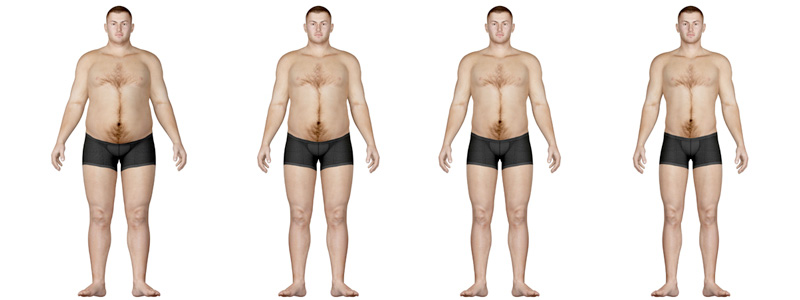Bariatric Surgery Arizona
Roux-en-Y Gastric Bypass

Roux-en-Y gastric bypass surgery is performed to help severely obese patients lose significant amounts of weight. The surgeon uses suture-like staples to separate a portion of the top of the stomach and create a pouch which is then connected directly to a section of the small intestine called the Roux limb. The name of this procedure derives from the surgical connection to the Roux limb and from the Y-shaped junction between stomach and small intestine.
Candidates for Roux-en-Y
While Roux-en-Y bypass surgery is an effective obesity solution for many patients, it is not right for everyone. There are several qualifications that a patient must meet to be considered a good candidate for this surgery. Many of these qualifications are medically required for patients seeking insurance coverage for their procedure. Most candidates for this procedure must be considered morbidly obese with a body mass index, or BMI, of 40 or higher. There may be exceptions made for individuals with a BMI of 35 or higher and a serious obesity-related medical condition. In order for a surgeon to consider performing Roux-en-Y gastric bypass, the patient should
- Be between the ages of 18 and 65
- Have been obese for at least 5 years
- Have tried other methods of weight loss with little to no success
In addition, the patient must be committed to making lifestyle changes relative to diet and exercise.
Benefits of Roux-en-Y

Along with the significant weight loss results this procedure often provides, Roux-en-Y bypass surgery may increase the patient's longevity and quality of life, making it easier to perform everyday functions.
Roux-En-Y bypass also helps to improve many obesity-related health conditions, such as hypertension, heart disease, gastroesophageal reflux (GERD), or type 2 diabetes.
The Roux-en-Y Bypass Surgery Procedure
During Roux-en-Y bypass, the surgeon decreases the size of the stomach by creating a small pouch, then attaches the pouch to the small intestine below the duodenum. Creation of the smaller stomach pouch restricts the amount of food that can be consumed at one sitting. In addition, the bypass technique limits the body's ability to absorb much of the food's caloric content. This combination of malabsorptive and restrictive techniques makes the Roux-en-Y procedure one of the most successful gastric bypass surgeries.
Risks of Roux-en-Y
Although Roux-en-Y bypass offers an unmatchable weight-loss solution for many obese patients, there are certain risks associated with this type of surgery. These risks may include:
- Excessive bleeding
- Blood clots
- Adverse reactions to anesthesia or medications
- Post-surgical infection
- Damage to adjacent organs
- Breathing problems
- Hernia at the incision site
In addition, risks particular to Roux-en-Y bypass may include:
- Gastric leaking
- Pouch stretching
- Gastric dumping syndrome
- Nutritional deficiency
- Dehydration
In almost all cases, these risks are outweighed by the medical advantages of weight loss.
Recovery from Roux-en-Y
Recovery from Roux-en-Y bypass is usually relatively smooth. While some discomfort is to be expected during the immediate aftermath of the procedure, patients should begin to experience beneficial results in a short time. After spending a few weeks on a liquid diet, patients can begin gradually reintroducing soft and then ordinary foods. They are instructed to eat small meals at regular intervals and to avoid heavy lifting for several months.
Patients who undergo Roux-en-Y bypass must be willing to make lifestyle changes to achieve and maintain weight loss and to prevent complications from the surgery. With determination, good nutrition and regular exercise, the results can be dramatic. Most patients lose about one to two pounds per week and reach a stable weight 18 to 24 months after surgery. After gastric bypass surgery, patients must follow a program including:
- Regular exercise
- Careful nutrition
- Vitamin and mineral supplementation
After any bariatric procedure, counseling or psychotherapy is usually recommended to assist patients in adjusting to lifestyle changes and maintaining weight loss.
Our Surgeons Specializing in Roux-en-Y Gastric Bypass

- Maria Brown, MD
- Fellowship Trained Bariatric & Foregut Surgeon
- Mesa
- Learn More

- Rita Hadley, MD, FACS, PhD
- General & Bariatric Surgeon
- Mesa
- Learn More

